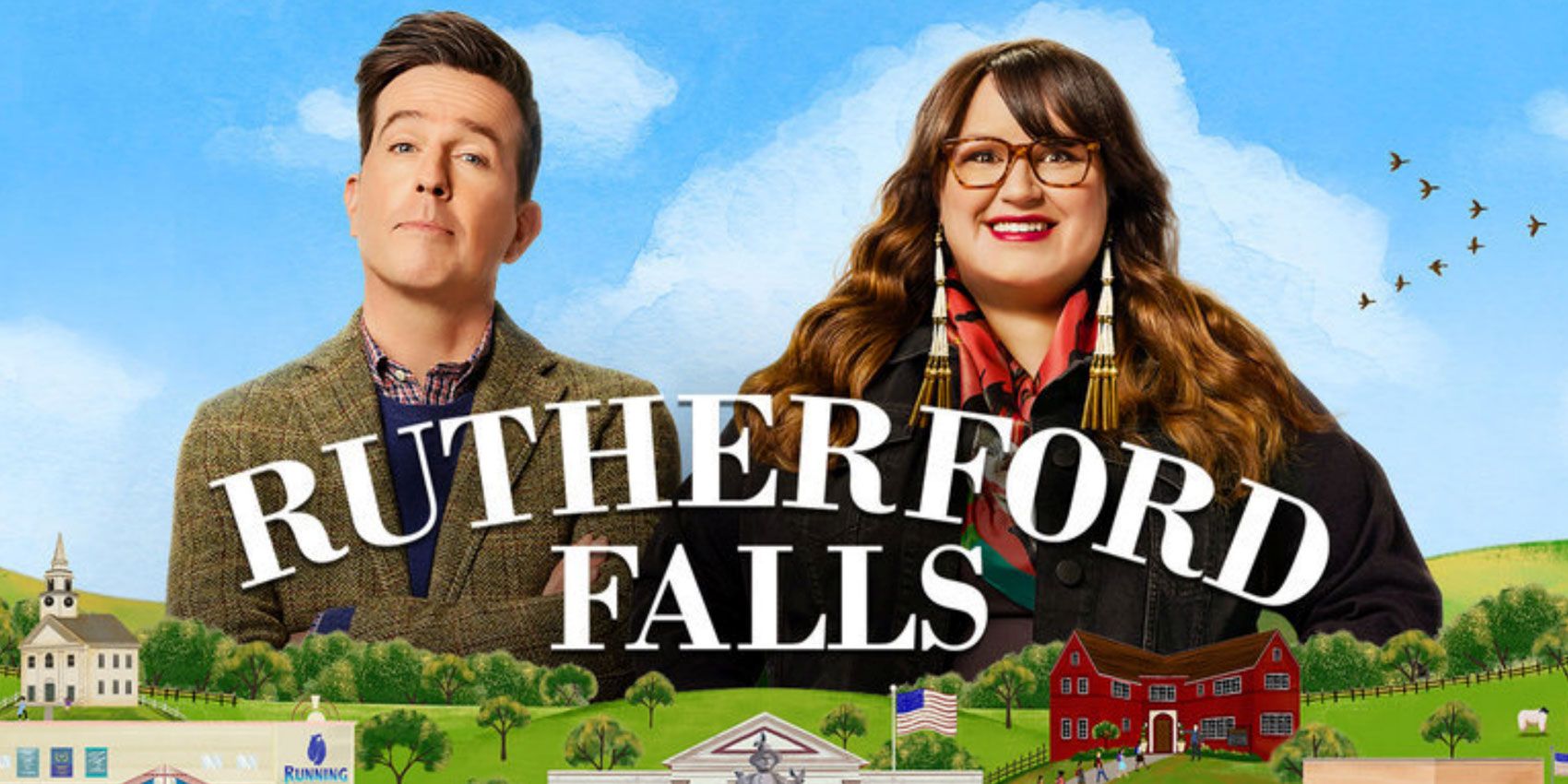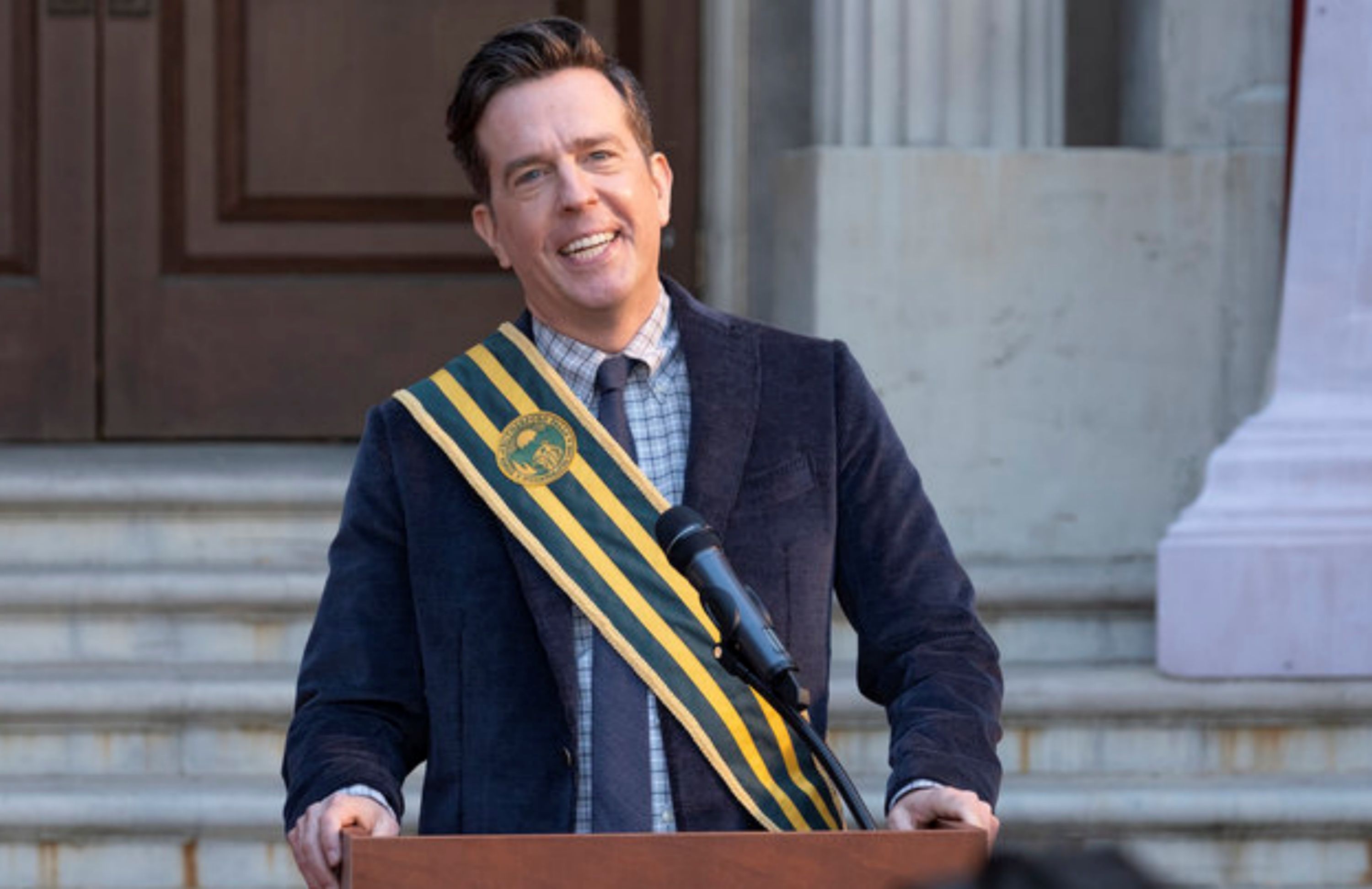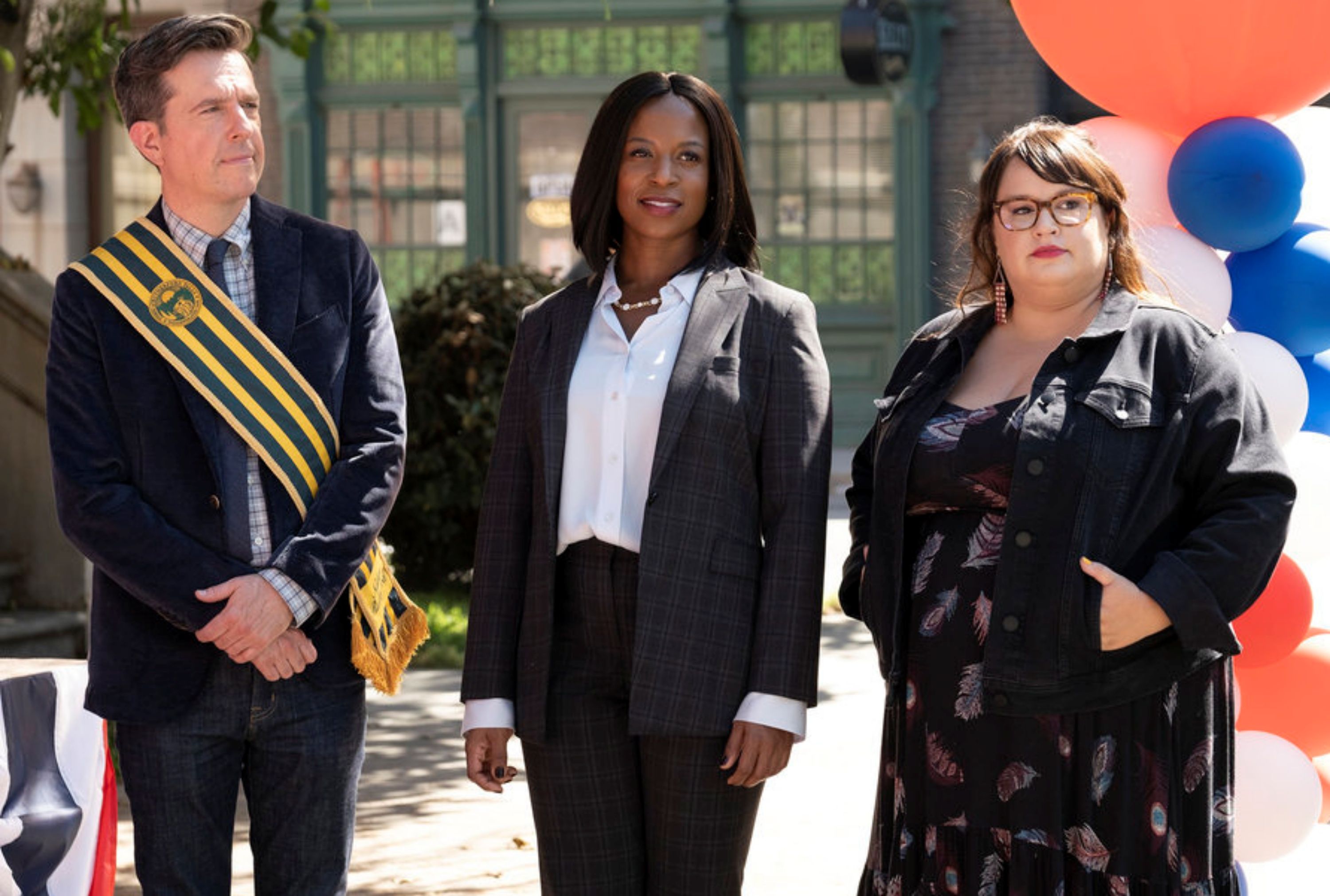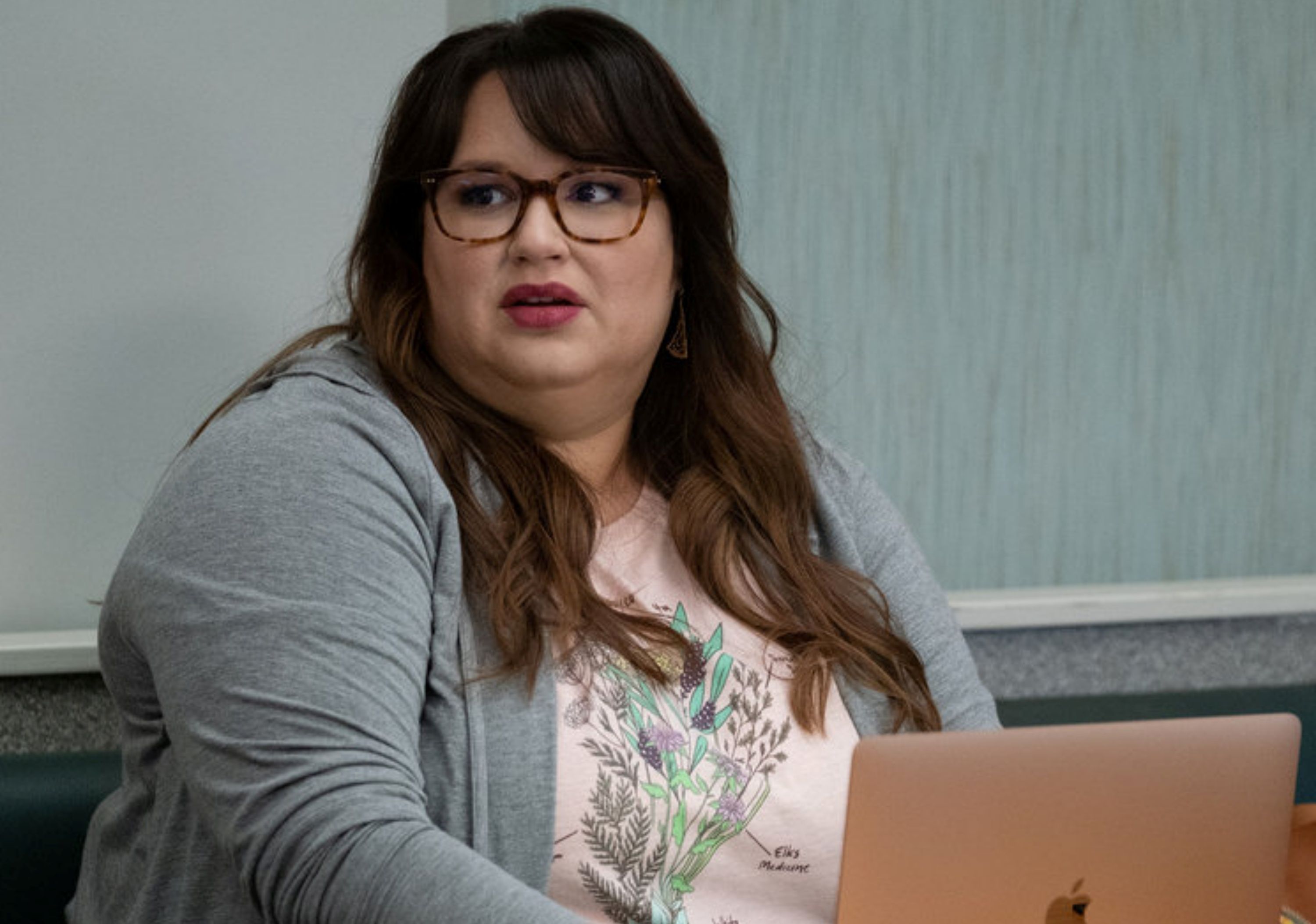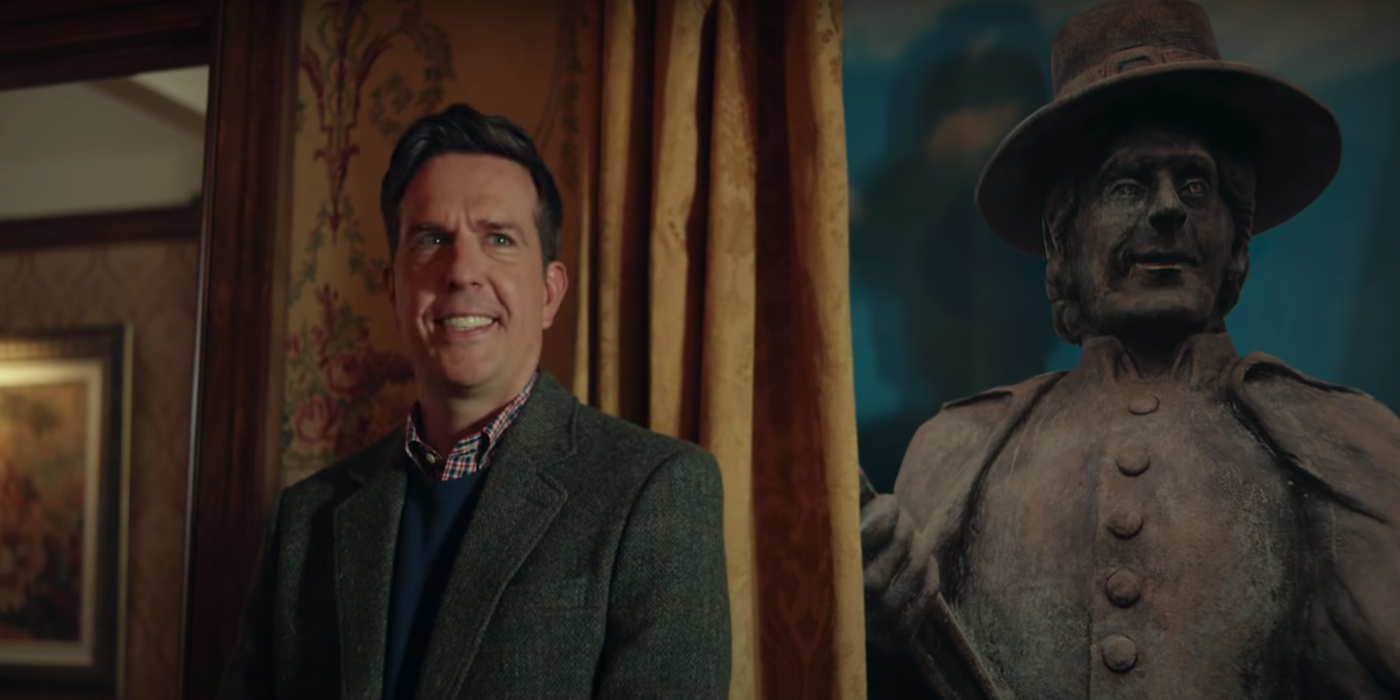From co-creators and executive producers Mike Schur, Ed Helms, and Sierra Teller Ornelas, the Peacock streaming comedy series Rutherford Falls tells the story of lifelong best friends Nathan Rutherford (Helms) and Reagan Wells (Jana Schmieding), who find themselves in an unexpected place when their small town decides it’s best to move the historical statue at its center. A constant source of traffic accidents, the statue is something of a menace, but to Nathan, it represents family, which is something that he’s ready to fight for.
During this 1-on-1 phone interview with Collider, Ornelas talked about what this project means to her as a Native person who makes media, how loosely developed things were when she signed on, why Schur is her “comedy Obi-Wan,” the stereotypes she wanted to avoid, assembling this cast, and turning comedy into a career.
Collider: I love this pairing between you and Mike Schur and Ed Helms, and I know that this show was brought to you in a partially developed form. When it was presented to you, what excited you about it and what did you see there, as far as like the missing piece that you felt you could bring to it?
SIERRA TELLER ORNELAS: As a Native person who makes media, you’re constantly offered these weird phone calls from random people who are like, “I have this project that has Native people in it and we’re shooting in an hour. Can you read it and tell me if it’s okay?” It’s already done and everyone’s been cast and you’re just like, “No thank you.” It was just so wonderful to get a call from two wonderful people who I’d worked with before, who are so funny. And then, they were like, “We have half an idea. Would you like to develop it with us?” They had worked together on The Office, I had worked with Mike on Brooklyn Nine-Nine, and I had developed a pilot previously with Ed, so we had certain working relationships. And then, they had come up with the character of Nathan Rutherford and the idea of doing it in a small town. They were talking about these themes of, why did we cling to certain narratives? Why do we hold onto certain stories? Why do they get frozen in time? Why are other stories marginalized and erased?
And so, when they came to me, they pitched it with a loose document. I remember thinking, “This is so great.” At the time, I had really wanted to write something with Native content in it and had this idea for an anthology series, so a lot of these themes and ideas were in my mind. I came at them with my experience working in museums and having a Native perspective, not the Native perspective. I said, “What if this person was Native instead? What if instead of this character being just an adversary, they had more to offer?” And there were multiple other characters and I had opinions on Nathan. And then, they came back with really, really great responses. I feel like we spent another year, just crafting the pitch, and then writing it. It was a really wonderful, organic experience where we all brought a lot to the table, but we were doing it together.
Did it go through any major evolutions or changes, along the way? Did anything drastically change, or was it just evolving the whole time?
ORNELAS: It was very loose when I got there, so I guess you could say it drastically changed once I got there. We had to make huge strides, at that point. I feel like we were in the car driving and we kept picking up people, and as we picked up more writers, it just got better and better. We just kept adding people and perspectives, and it honed what we had started with. We came in with this intention and everybody pitched on it, and it got sharper and sharper and more in focus.
Once you took this out to pitch it, did you go to a lot of networks or was it just Peacock? How did you figure out the right home for this?
ORNELAS: We went everywhere, which I had never really experienced before. It was a very long process. I worked on a whole season of TV, while this was happening. We pitched it and it spent a moment at Apple. Apple ended up not proceeding, but we had this really great script that we were so proud of. When we started pitching, Peacock didn’t exist. By the time we had done and gotten through the process, it did. They called and said, “We’d love to see it. We love all three of you guys.” And then, they ended up buying it straight to series. I feel very at home at Peacock and I feel like they really had a great handle on what we were trying to do. There was just a huge level of trust in the story that we were trying to tell.
What do you like about working in collaborating with Mike Schur? How does his humor and approach to things work with yours?
ORNELAS: He’s my comedy Obi-Wan. A lot of times, on the first day of work, showrunners will say, “This is the kind of guy I am,” and then you find out who they are. He actually is the guy that he claims to be. He’s incredibly thoughtful. I’m the showrunner on the show, but he’s one of the producers and co-creators and he’s incredibly collaborative. A lot of times you hear, “Best idea wins,” and most of the time, the person with the most power is like, “No, actually, it’s my idea that’s going to win.” He just isn’t like that. He genuinely likes funny people. He genuinely likes to collaborate. It’s not an act. Someone that powerful, I’m always amazed when they’re genuinely nice people, and he really is. I’ve had really great bosses. I’ve been very blessed. But as a collaborator, he’s just incredibly kind and funny and he really listens. I can’t speak highly enough of him. Also, with Ed, you can get that stereotype of the actor who’s working on the show, but he was in the room, every single day. He was incredibly kind, he listened and collaborated, and it just was a really organically fun and healthy room.
What do you love most about creating the inhabitants of this world and playing with them and their dynamics?
ORNELAS: I’m from Tucson, which is not a small, small town, but I always run into people that I went to high school with when I go home. It’s that kind of town. We had a lot of writers from smaller towns and some of the Native writers had grown up on their reservations. There’s something about misconceptions of small towns and how we’ve stuck to that idea of 1950s Mayberry, but there’s so much more nuance to those characters. People have a very stereotypical, desolate, despair idea of reservations and they can be that, but there’s also Uncle Ernie in the hot tub. There’s also this variety that you get in small towns that people lose sight of. It was really exciting to have these crazy characters that are very specific. There are also so many different types of Native characters. On shows, it’s always one character, if you’re lucky, and they’re expected to represent everyone. And so, really getting to show that variety and that specificity, really lended itself to really interesting characters who feel human and feel real, but are also really funny and really dynamic. Those are the people that I grew up with and that I’m related to. Just to clarify, I didn’t grow up on my reservation.
Is that how you also approach the show overall, as far as thinking about what future seasons would be?
ORNELAS: What we wanted to do is follow this friendship and how these external factors can really affect these two people who’ve known each other and their dynamic has become really defined., and then you turn that upside down. It was really about finding a way to the funniest version of this, with these three main characters who are dealing with each other under these circumstances versus trying to talk about giant issues or pointedly towards certain things, if that makes sense. It’s the situations and chasing those dynamics, and finding the comedy, romance and family stories in them. It’s about really seeing these characters interacting with each other and exploring those dynamics.
I love that Jana Schmieding started out as a writer on the show and now she’s one of the leads. At what point did you see her as Reagan?
ORNELAS: I just found her incredibly funny. When we were getting submissions from people, people would send like short films that they’d made or videos they’d done or things like that, she had done these really funny short films. There was one where, when she lived in New York, she did a take on a panhandler in the subway and she was asking for a date. She was like, “I have not dated in many years. I need help. If anyone here is available, or if you know anyone who’s available, I’ll take any number.” It was so like incredibly cool and weird. It was such a big swing and you were just immediately rooting for her. I just never really forgot that. And Mike and Ed being on The Office and coming from shows where actors could also be writers, like Mindy Kaling and BJ Novak, I was like, “Can the writers audition?” And they were like, “Yeah, of course.” I was like, “Okay, great, then we’ll have them audition for everything.”
And so, we ended up hiring Bobby Wilson to be Wayne, and I was very excited to have Jana play Reagan and see how she would do in her audition. She just really nailed it. She was the funniest and the best. We kept going through this process and I was like, “If, at a certain point, it’s not the way to go, there’s no hard feelings,” but she just always really nailed it. There’s nothing better than writing these words and hoping you meet the person who will say them the way you heard them in your head or better, and that was Jana and Michael [Greyeyes] and Jesse [Leigh], and that is what happened in each of those moments.
When I spoke to Jana about it, she said that she felt like you guys were just humoring her by letting her audition and were just making her feel good about getting to do it. When you told her that she actually got the role, did you have to convince her that you were serious?
ORNELAS: It was the weirdest time because our production had just been shut down, due to COVID. The lights went out in L.A. and everybody went back to their homes. I FaceTimed her and was taking screenshots the entire time because I wanted her to know what she looked like. I was like, “This is happening.” Natives on TV is such a long time coming. You do these jobs because you hope that someday you’ll see this happen, but you never really think you’re going to be the person who gets to do it. You just want it to happen. All you know is that you want it to happen. So, the whole experience, we were all acclimating to like, “I’m in a writers’ room with four other Native writers. We’re going to write scripts with multiple Native parts. We don’t all have to be perfect and we don’t have to be villains. So much of this experience has been truly hard to even wrap my head around, as we’re doing it. And so, I’m not surprised that that’s how Jana felt. That’s how we were feeling at different parts of this process.
It’s so hard to make television that it was great to just be in a group of people where you’re enjoying what you’re making . . . I love comedy and I love television and I love Native people. We are not a monolith. We are all so different and we come from different nations. From the actors to the extras, and any Native person on the show, we all felt this need to really channel how much we love where we come from and our community and infuse that into what we’re making. We’re all so excited for people to see this show. With both the writing and the acting, we had an abundance of Native talent. I don’t ever want people to think that we hired writers because those actors weren’t out there. There were so many Native actors that we’d never even heard of, but that we found and that we want to write parts for, eventually. There really was an abundance, and it was a lovely feeling to know that.
You’ve written and worked on some really funny shows. When did you realize that you were funny and could turn your own sense of humor into a career, and how challenging was that to then translate being funny into actually writing something funny?
ORNELAS: My dad loved comedy growing up. He wanted to be a stand-up comic. For some reason, my family really valued comedy. I would get out of trouble, if I could be funny. It was really weirdly rewarded in our household in a way that I found out later is not the norm. I just always loved comedy. And then, as I got a little older, I was like, “Okay, am I actually going to try to do this as a job, or do I just focus on my job at the museum?” It was during the ‘08 crash when government workers were furloughed that I went, “Well, I don’t have a husband or any debt or any kids or anybody that would really be impacted, if I made a big swing.” So, I like went out to Santa Fe, where they were offering this class in TV writing and I wrote some bad samples that turned into better samples and just started applying to these programs. I felt like, at a certain point, they’ll just say, “No, thank you,” but it just kept going forward. I was like, “Well, I’ll just play out these cards as long as I can.” And then, once I got into a writers’ room and I was meeting people who wrote the stuff that I remembered as a high school kid, I was like, “Oh, these are my people. I want to stay here. I’ll do anything to stay here.” And then, you figure it out and acclimate. I’ve always wanted to be a TV writer, ever since I was a little kid watching The Dick Van Dyke Show and seeing Rob Petrie and Rose Marie in this writers’ room. I was like, “Oh, that’s a job. I want to do that.” It’s been a crazy journey, but it’s been really wonderful.
Being a showrunner is an interesting job because you have to know a little bit about everything, and answer questions and make decisions, wherever they’re coming from. What have you learned about yourself from the experience of being the showrunner of a TV show?
ORNELAS: That I’m happiest when everyone feels like they’re a part of something that they want to participate in and that everyone feels like they’re invested in and a part of the shared project. I’ve worked in rooms before where you felt like there was one person you were serving and the goal was just to make that person happy. And then, I’ve worked in other rooms that were super collaborative and, with every episode of the show, there’s a little bit of me in there. I always loved those rooms, so getting an opportunity to create one of those rooms helped me as a boss, as much as it helped me when I was a lower level writer. That kind of real collaboration was just really wonderful. Maybe it means I can’t write by myself, but I really like the collaboration part of it the most.
How much has that inspired you, for your own projects? Do you feel like you have a lot of ideas for new projects that you want to work on, beyond this show?
ORNELAS: Yeah, I think so. I worked on a show called Happy Endings and I was a staff writer on that show. Now, out of 20 writers and assistants, 18 of them became showrunners, including myself. My dream is to just keep going. I don’t know if we’re the first Native show of this level, but I don’t want us to be the last. All of the writers on our show, and specifically the Native writers on our show, I want them all to have shows. I want them to tell stories. We are not the Native perspective, we are a Native perspective, and I just want there to be as many Native perspectives out there as possible. Just knowing that we’ve done it this season, I want to keep making this show and I want to keep the train going on Native narratives on television and in film.
Were there conversations about Native stereotypes that you wanted to avoid?
ORNELAS: Definitely. One of the things I would bring up a lot, and we would bring up in the room, is that there are stereotypes that Native people are exhausted by and so over that white people don’t even know exist. It was trying to subvert while also making people aware of certain things that we’ve been aware of for forever, that lended itself to better storytelling, by trying to do that. We always talked about that. We also have a very diverse cast and everything is done very thoughtfully, but many conversations went into a lot of this stuff, for sure. Our writers’ room was very diverse. It was diverse, at all levels, with people of color and LGBTQ people. It wasn’t bottom heavy or top heavy, in that way. Setting that tone where people are allowed to ask questions and make mistakes and say how they feel, just makes for better storytelling and it makes for more specific, more funny and interesting stories.
Rutherford Falls is available to stream at Peacock TV.

